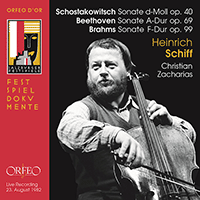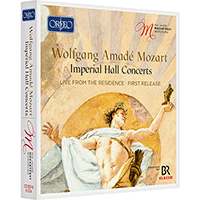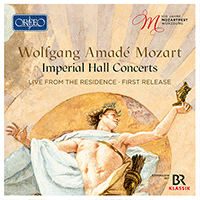Christian Zacharias
Although born in India, Christian Zacharias grew up in Karlsruhe. He began piano lessons with Elena Slavin at the age of ten at the Staatliche Hochschule für Musik in Karlsruhe. Slavin was a descendant of the Leschetizky school, instilling in her pupils the traditions of the Viennese master and those of the St Petersburg school where the repertoire was based on Chopin, Liszt and Rachmaninov. Although he studied with her for ten years, Zacharias did much to avoid this repertoire as he greatly preferred the music of the Classical era by Mozart, Haydn, Beethoven and Schubert. After winning second prize at the Geneva International Piano Competition, Zacharias went to Paris to study with Vlado Perlemuter, following which he won second prize at the Van Cliburn Competition in Texas and two years later, no doubt helped by his studies with Perlemuter, first prize in the Ravel Competition in Paris.
In May 1977 Zacharias took part in a thirteen-concert tour of West Germany and Rotterdam with the BBC Symphony Orchestra, sharing the billing with Clifford Curzon. At his London debut the following year he played the Piano Concerto No. 2 in B flat Op. 19 by Beethoven with the London Philharmonic Orchestra and James Conlon. Zacharias’s career has been centred more on playing concertos than solo recitals and he has made a reputation for himself in the piano concertos of Mozart. His playing of the Piano Concerto in E flat K. 449 at the Proms in 1981 prompted Hilary Finch to write, ‘His urbane, minutely shaded phrasing, the core of energy and movement inside the stillness of the second slow movement, the self-mocking rigours of its teasing rondo-finale were just random manifestations of the deep understanding he shared with the orchestra of this work’s uniquely concentrated, exuberantly concerted action.’
Zacharias’s performances are often described as unpretentious, having great clarity, almost as if he were playing chamber music, but at its extreme his style was once described as ‘…almost startlingly bare of wit or loveliness, but justifying itself in terms of plain purity’.
In 1992 Zacharias made his debut as a conductor with the Suisse Romande Orchestra in Geneva. There followed invitations to conduct in Europe and at a two-week festival with the Los Angeles Philharmonic Orchestra. Zacharias has worked with many orchestras, often directing Mozart piano concertos from the keyboard, as well as conducting Schubert and Haydn.
In 2000 he became artistic director and principal conductor of the Orchestre de Chambre de Lausanne, a small group of instrumentalists which Zacharias prefers to a large orchestra. ‘A small group is better able to emerge and express themselves. I prefer that to the anonymity of a big orchestra.’ Although their repertoire is based on his favourites of Mozart, Haydn and Schubert, Zacharias hopes eventually to conduct a large orchestra in works such as Bruckner symphonies. Not an advocate of ‘authentic’ instruments, he thinks many musicians are ‘old-fashioned’, admires the ‘protagonists’ such as Glenn Gould and Friedrich Gulda, and was influenced by a series of Mozart concertos given in Amsterdam by Gulda and Nikolaus Harnoncourt.
During the 1999–2000 season Zacharias celebrated his fiftieth birthday by performing cycles of Mozart’s works in the major music capitals of the world.
With the exception of Scarlatti sonatas, Zacharias plays little Baroque music. His repertoire is predominantly Classical, based around Mozart, Haydn, Schubert and Beethoven, but he also plays Stravinsky and Ravel and although he has studied music of the Second Viennese School he has said, ‘…it doesn’t mean anything to me. That’s intellectual music in the pejorative sense – something that works within its own little ivory tower and leaves one’s humanity untouched.’
Zacharias has recorded a great deal for EMI. During the 1980s a fine disc of fifteen Scarlatti sonatas appeared as well as some Beethoven concertos with the Dresden Staatskapelle and Hans Vonk. Zacharias is keen to present a ‘Classical’ performance, and the Adagio un poco mosso of the Piano Concerto No. 5 in E flat Op. 73 is taken at a much faster speed than usual. He has recorded Mozart piano concertos with various conductors including David Zinman, Neville Marriner, Günter Wand, and Jerzy Maksymiuk. A disc of Mozart’s two piano quartets from 1988 is impressive, with concentrated ensemble work from Frank Peter Zimmermann, Tabea Zimmermann and Tilmann Wick. Other chamber recordings include the Schumann Piano Quintet Op. 44 and quintets for piano and wind by Beethoven and Mozart.
Of the solo piano repertoire, Zacharias recorded the complete piano sonatas of Mozart between 1987 and 1990 and in the early 1990s recorded eleven piano sonatas by Schubert. He has also recorded a good deal of Schumann for EMI including Papillons Op. 2, Davidsbündlertänze Op. 6, Kinderszenen Op. 15 and Noveletten Op. 21. Recent EMI recordings include a fiftieth birthday celebration two-disc set of radio recordings of Ravel, Schumann and Chopin, and Chopin’s complete scherzos. This, and other EMI recordings, including Mozart’s Concerto for Two Pianos in E flat K. 365, have only been issued in Germany.
More recently Zacharias has recorded for Dabringhaus und Grimm (MDG). Another disc of Scarlatti sonatas has appeared, but most of the recordings are of chamber or concertante works. Dvořák’s Piano Quintet Op. 81 and Schubert’s ‘Trout’ Quintet with the Leipzig String Quartet have received excellent reviews. Zacharias appears as pianist and conductor of the Lausanne Chamber Orchestra on a disc of Schumann’s works for piano and orchestra, including the Piano Concerto in A minor Op. 54. Rather than record the complete piano concertos of Mozart, Zacharias has programmed them with a symphony and vocal works, but with the appearance of Mozart Piano Concertos Volume 1 in 2003, it would seem that he plans to record the complete cycle.
Recordings from the Van Cliburn Piano Competition have been issued by VAI and on Volume 7, Zacharias appears playing Debussy’s Reflets dans l’eau and Webern’s Variations Op. 27, plus some Rachmaninov and Beethoven.
© Naxos Rights International Ltd. — Jonathan Summers (A–Z of Pianists, Naxos 8.558107–10).



















